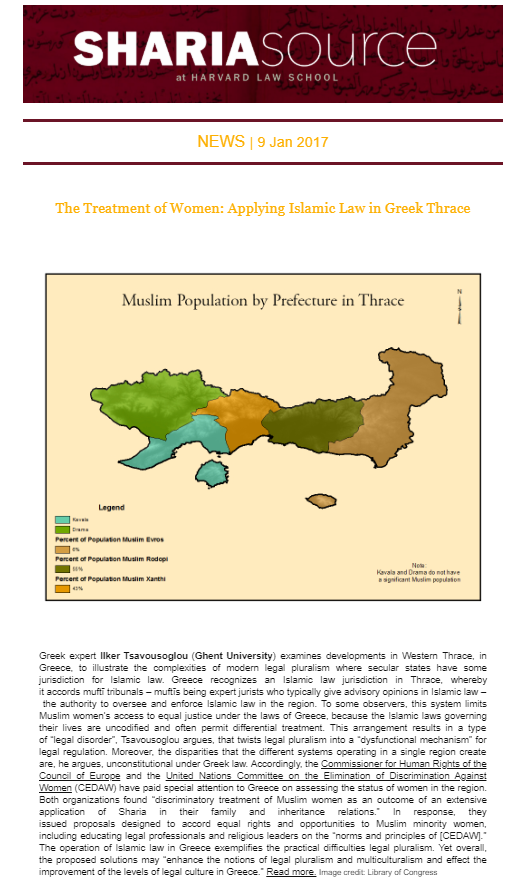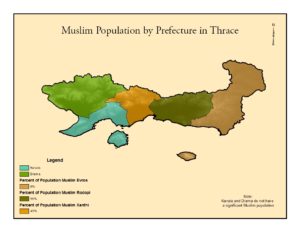
 The Treatment of Women: Applying Islamic Law in Greek Thrace Greek expert Ilker Tsavousoglou (Ghent University) examines developments in Western Thrace, inGreece, to illustrate the complexities of modern legal pluralism where secular states have some jurisdiction for Islamic law. Greece recognizes an Islamic law jurisdiction in Thrace, whereby it accords muftī tribunals – muftīs being expert jurists who typically give advisory opinions in Islamic law – the authority to oversee and enforce Islamic law in the region. To some observers, this system limits Muslim women’s access to equal justice under the laws of Greece, because the Islamic laws governing their lives are uncodified and often permit differential treatment. This arrangement results in a type of “legal disorder”, Tsavousoglou argues, that twists legal pluralism into a “dysfunctional mechanism” for legal regulation. Moreover, the disparities that the different systems operating in a single region create are, he argues, unconstitutional under Greek law. Accordingly, the Commissioner for Human Rights of the Council of Europe and the United Nations Committee on the Elimination of Discrimination Against Women (CEDAW) have paid special attention to Greece on assessing the status of women in the region. Both organizations found “discriminatory treatment of Muslim women as an outcome of an extensive application of Sharia in their family and inheritance relations.” In response, they issued proposals designed to accord equal rights and opportunities to Muslim minority women, including educating legal professionals and religious leaders on the “norms and principles of [CEDAW].”The operation of Islamic law in Greece exemplifies the practical difficulties legal pluralism. Yet overall, the proposed solutions may “enhance the notions of legal pluralism and multiculturalism and effect the improvement of the levels of legal culture in Greece.” Read more. Image credit: Library of Congress
The Treatment of Women: Applying Islamic Law in Greek Thrace Greek expert Ilker Tsavousoglou (Ghent University) examines developments in Western Thrace, inGreece, to illustrate the complexities of modern legal pluralism where secular states have some jurisdiction for Islamic law. Greece recognizes an Islamic law jurisdiction in Thrace, whereby it accords muftī tribunals – muftīs being expert jurists who typically give advisory opinions in Islamic law – the authority to oversee and enforce Islamic law in the region. To some observers, this system limits Muslim women’s access to equal justice under the laws of Greece, because the Islamic laws governing their lives are uncodified and often permit differential treatment. This arrangement results in a type of “legal disorder”, Tsavousoglou argues, that twists legal pluralism into a “dysfunctional mechanism” for legal regulation. Moreover, the disparities that the different systems operating in a single region create are, he argues, unconstitutional under Greek law. Accordingly, the Commissioner for Human Rights of the Council of Europe and the United Nations Committee on the Elimination of Discrimination Against Women (CEDAW) have paid special attention to Greece on assessing the status of women in the region. Both organizations found “discriminatory treatment of Muslim women as an outcome of an extensive application of Sharia in their family and inheritance relations.” In response, they issued proposals designed to accord equal rights and opportunities to Muslim minority women, including educating legal professionals and religious leaders on the “norms and principles of [CEDAW].”The operation of Islamic law in Greece exemplifies the practical difficulties legal pluralism. Yet overall, the proposed solutions may “enhance the notions of legal pluralism and multiculturalism and effect the improvement of the levels of legal culture in Greece.” Read more. Image credit: Library of Congress
 REPORT: National Commission on Human Rights Decisions on Marriages by Proxy (Greece, 2003) Greece’s National Commission on Human Rights has been taking a close look at Muslim women’s access to justice in Thrace, Greece. Although the Greek government has carved out an Islamic law jurisdiction in Thrace, the state continues to question the legality of marriage by proxy and marriage of minors—two modes of marriage that the local practice of Islamic law permits. This document outlines the Greek government’s analysis of whether marriages by proxy are compatible with “the national public order” and Greece’s “obligations to international conventions.” Read more. Image credit: Public Domain/Flickr
REPORT: National Commission on Human Rights Decisions on Marriages by Proxy (Greece, 2003) Greece’s National Commission on Human Rights has been taking a close look at Muslim women’s access to justice in Thrace, Greece. Although the Greek government has carved out an Islamic law jurisdiction in Thrace, the state continues to question the legality of marriage by proxy and marriage of minors—two modes of marriage that the local practice of Islamic law permits. This document outlines the Greek government’s analysis of whether marriages by proxy are compatible with “the national public order” and Greece’s “obligations to international conventions.” Read more. Image credit: Public Domain/Flickr
 LEGISLATION: Introductory Report to the Bill, ‘Amendment of Provisions of Family Law’ (2010) Greek parliamentarians have signaled that they are concerned about the rights of Muslim women, especially young women in Thrace–which permits the operation of Islamic law to certain areas. A group of parliamentarians recently drafted a bill designed to prioritize Greek civil law over religious (namely Islamic) family law. One intent shared by the sponsors of the bill was to abolish sharīʿa altogether. However, the bill was never brought before Parliament. Read more. Image credit: The Worldly
LEGISLATION: Introductory Report to the Bill, ‘Amendment of Provisions of Family Law’ (2010) Greek parliamentarians have signaled that they are concerned about the rights of Muslim women, especially young women in Thrace–which permits the operation of Islamic law to certain areas. A group of parliamentarians recently drafted a bill designed to prioritize Greek civil law over religious (namely Islamic) family law. One intent shared by the sponsors of the bill was to abolish sharīʿa altogether. However, the bill was never brought before Parliament. Read more. Image credit: The Worldly
See the full newsletter.

